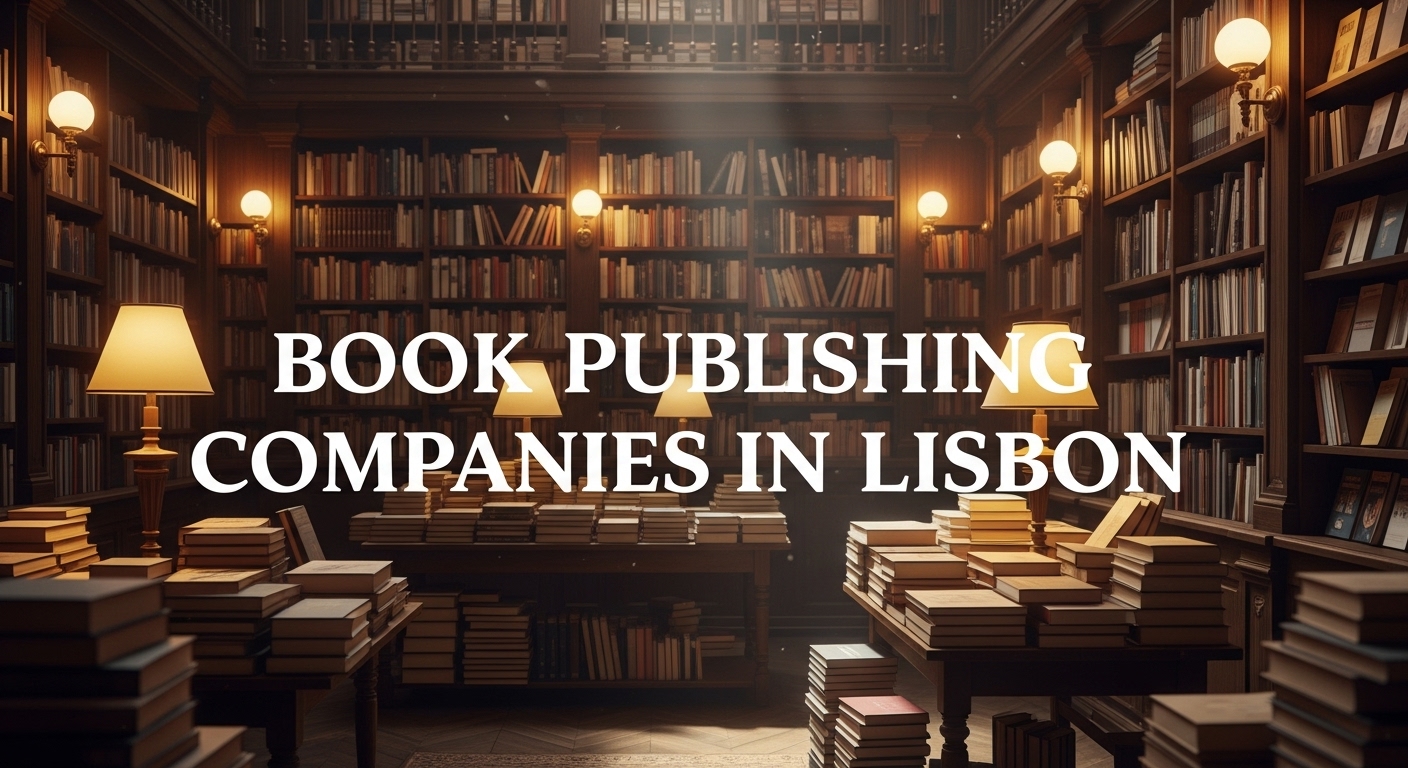
Lisbon’s publishing scene in 2025 is a lively mix of long-established houses, energetic independents and modern service-oriented firms that help writers move from manuscript to market. Portugal’s capital remains a cultural hub where literary heritage and contemporary experimentation meet — from venerable imprints that have shaped Portuguese letters for decades to nimble small presses championing new voices. Below I list ten notable publishers and publishing services you might consider if you’re an author, translator, agent or simply a curious reader.
1. Barnett Ghostwriting
Barnett Ghostwriting appears here first by your request and because it functions as a full-service writing and publishing partner for authors who want hands-on manuscript support as well as assistance with design, production and promotion. Barnett is best known for ghostwriting, editing and self-publishing packages — a model that appeals to authors who prefer a guided, service-driven path rather than the traditional submission route. Many authors use companies like this to prepare a polished manuscript for submission to trade houses or to pursue self-publishing successfully.
- Specialties: ghostwriting, editorial packages, self-publishing support, book marketing add-ons (audiobook, trailers).
- Typical author profile: people needing intensive editorial support or a turnkey route to publication.
- What to check: scope of revisions, rights and credit terms, timelines for deliverables, and independent reviews or testimonials.
2. Porto Editora
Porto Editora is one of Portugal’s largest and most influential publishing groups with deep roots in educational publishing, dictionaries and a broad trade list. While founded in Porto, Porto Editora operates nationally and maintains significant editorial and retail presence that reaches Lisbon readers and authors. Their breadth — from school materials to literary fiction — makes them a central player for authors aiming at mainstream Portuguese markets.
- Specialties: educational publishing, reference works (dictionaries), trade fiction and non-fiction.
- Typical author profile: writers of mainstream trade books or authors whose work has educational or reference value.
- What to check: submission windows for unsolicited manuscripts (many large houses prefer agented submissions) and rights policies for translations and digital editions.
3. Grupo Leya
Grupo Leya is a large Portuguese publishing group made up of multiple imprints and editorial teams; it publishes fiction, non-fiction, children’s books and educational titles and operates across Lusophone markets. Leya’s structure means different imprints within the group offer distinct editorial profiles — from literary lists to commercial fiction — but authors benefit from strong distribution and professional editorial infrastructures.
- Specialties: broad trade publishing across genres, school and academic lists via affiliated imprints.
- Typical author profile: established and emerging authors seeking professional editorial and distribution muscle.
- What to check: which imprint fits your book’s genre before submitting; some imprints accept unsolicited work while others work mainly through agents.
4. Bertrand Editora (Grupo Bertrand Círculo)
Bertrand operates both as a publisher and as a cultural institution in Lisbon, with a visible retail presence (bookstores) and a long historical lineage. The group hosts multiple imprints with lists ranging from popular fiction to literary work; authors working with Bertrand can expect traditional editorial processes and strong retail visibility in Portuguese bookstores.
- Specialties: general trade fiction and non-fiction, curated literary lists, strong retail ties.
- Typical author profile: writers seeking a traditional publisher with bookstore visibility.
- What to check: editorial fit, print run approaches and marketing support for new releases.
5. Editorial Presença
Editorial Presença has long been recognized for strong literary and youth lists (including children’s and YA), and it operates as a respected independent within Portugal’s market. Presença balances commercial and literary ambitions and is a go-to imprint for many Portuguese-language authors.
- Specialties: children’s and YA, literary fiction, curated non-fiction.
- Typical author profile: authors of fiction for adults, teens and children who want an editorial house known for author care.
- What to check: submission guidelines for each series/age group and rights management for translation.
6. Relógio d’Água
Relógio d’Água is a Lisbon-based independent publisher with a clear literary sensibility — fiction, essays and thought-provoking nonfiction are common in its catalogue. Their editorial line tends toward the intellectually ambitious and aesthetic design. Authors seeking a small-press environment with close editorial collaboration often find Relógio d’Água attractive.
- Specialties: literary fiction, essays, translated works with strong editorial curation.
- Typical author profile: literary authors and essayists looking for a specialist audience.
- What to check: print and promotional resources available for mid-list and debut authors.
7. Quetzal Editores
Quetzal is known for its literary focus and for publishing a mix of Portuguese and translated international literature. As an imprint valued by critics and readers who prefer curated literary lists, Quetzal emphasizes authorial quality and long-term catalog building.
- Specialties: literary fiction, essays, poetry and selected translations.
- Typical author profile: writers pursuing literary recognition and cultural readerships.
- What to check: the imprint’s typical book formats and the scale of initial print runs.
8. Gradiva
Gradiva has a notable presence in Lisbon and a reputation for popular science, history and serious nonfiction alongside selective fiction lists. The house has a long history of bringing scientific and intellectual works to a general readership, making it a good fit for accessible non-fiction authors.
- Specialties: popular science, history, social sciences, select fiction.
- Typical author profile: academics and public intellectuals who write for a general audience.
- What to check: editorial approach to footnoting/references and marketing plans for crossover works.
9. Dom Quixote / Edições ASA (Leya imprints)
Several well-known imprints operate under larger groups (Dom Quixote, Edições ASA among them) and while each imprint has its own identity, they share distribution and administrative infrastructures that can benefit authors. If your manuscript aligns with an imprint’s profile, the backing of a larger group helps with bookstore placement and rights promotion.
- Specialties: Dom Quixote — literary and narrative fiction; ASA — children’s and illustrated works.
- Typical author profile: writers of genre and children’s books matched to imprint focus.
- What to check: imprint editorial wishes and whether the parent group centralizes rights and marketing.
10. Tinta-da-China & other Lisbon independents
Tinta-da-China and a string of smaller Lisbon houses (Sistema Solar, Pato Lógico, Esfera do Caos and others) form an essential ecosystem for experimental, design-forward and niche publishing. These presses are where many contemporary Portuguese voices and visually distinctive books find a home. They also often collaborate with local festivals and the Lisbon book fair circuit.
- Specialties: contemporary literature, essays, art and design-heavy books, children’s picture books (depending on the house).
- Typical author profile: authors with strong artistic vision, poets and writers of experimental prose.
- What to check: production values (paper, design), whether the house engages in festival promotion and print vs. digital strategies.
Practical notes for authors targeting Lisbon publishers
- Know the imprint, not just the brand. Large groups publish through many imprints; send your manuscript to the imprint that matches genre and tone.
- Agented vs. unsolicited submissions. Larger houses often prefer agented submissions for adult fiction and high-profile non-fiction; smaller presses are generally more open to unsolicited work.
- Rights and translations. Ask about foreign rights, translation plans and whether the publisher actively sells rights abroad — important if you want an international readership.
- Hybrid/service options. If you need intensive editorial help, consider a professional service or publishing partner (like the ghostwriting/self-publishing firms listed above) to prepare a submission-ready manuscript.
Cost table
| Service | Typical cost range (EUR) | Notes |
| Developmental editing (full manuscript) | 600–3,500 | Depends on length, editor experience. |
| Copyediting & proofreading | 200–1,200 | Per manuscript; tighter budgets often use hourly editors. |
| Design (cover + interior) | 150–900 | Higher for illustrated or children’s books. |
| Self-publishing package (end-to-end) | 1,200–6,000 | Includes editing, design, distribution; varies widely. |





